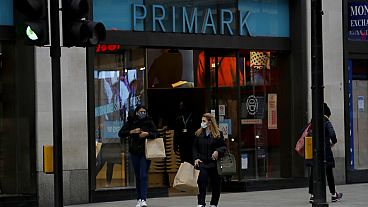The average UK citizen is £10,200 poorer than they were as a result of the "Great Recession", says a new report by the Centre for Cities.
Had the economy grown at its pre-2010 trajectory, people in the UK would be £10,200 (€11,928) wealthier on average, according to the Cities Outlook 2024.
"The UK has had a torrid time," said Andrew Carter, Chief Executive of the Centre for Cities.
"Everywhere, up and down the country, including places that were doing relatively well before, has been levelled down because of the lack of growth."
A comparison of the UK's 63 largest cities and towns shows that every region has lost out since the "Great Recession" between 2007 and 2009 - also known as the banking crisis that devastated the world's financial markets - with some suffering more than others.
Gross disposable income growth per head was £13,590 (€15,894) lower in London than it would have been if it had risen in line with 1998-2010 trends, and people in the North East areas of Middlesbrough and Sunderland experienced similar losses of £13,200 (€15436) and £12,730 (€14887) per head, respectively.
Individuals in Cardiff were £13,080 (€15296) worse off on average, and this figure came in at £16,030 (€18,746) in Edinburgh and £10,150 (€11870) in Belfast.
Aberdeen was the city that fared the worst in terms of disposable income, predominantly down to the loss of jobs in the oil and gas sector.
Had pre-2010 growth continued, the Cities Outlook shows that individuals in Aberdeen would, on average, have an extra £45,240 (€52905) in their pockets.
In just seven areas of the UK, the disposable income growth was higher from 2010 to 2021 than that experienced between 1998 and 2010.
In nearly all instances, however, this can be explained by poor growth in the earlier period.
What is slowing disposable income growth?
The crux of the UK's growth problem is that, while there has been a significant rise in employment since 2010, productivity has not increased at the same rate.
Some 2.5 millions jobs were created in the UK between 1998 and 2010 whereas, in 2022, there were 4.6 million more jobs in the UK than there were in 2010.
In contrast, the UK's productivity figures have been disappointing over the last 15 years.
Between 2010 and 2021, productivity at a national level showed an annual average growth of 0.6% in real terms, compared with 1.5% growth seen between 1998 and 2010.
"The average worker's real pay has tracked the dramatic slowdown in GDP per hour growth very closely," Professor John Van Reenen of LSE told Euronews Business.
He added: "If the economic pie grows less fast, there is less to share out."
Looking at the local figures, all but two cities saw a rise in unemployment in the pre-2010 period, with 11 cities reporting job growth of over 20%.
Productivity growth nonetheless lagged across almost all cities, even for formerly high performers like Cambridge, Milton Keynes and London.
The disparity between these two economic drivers can be explained by looking at the type of jobs that have been created, according to the Cities Outlook.
Although the UK has not struggled to create jobs, these jobs often involve low productivity activities.
The changing nature of poverty
An increase in jobs has allowed many individuals to lift themselves out of absolute poverty in the past decade and half, meaning that more people have access to essentials such as food and clothing.
That said, the Cities Outlook shows that the number of children living in relative poverty, meaning their household earns less than 60% of the median annual income, has increased.
In 2021, there were six cities (all in the North and the Midlands) where over a third of children were from households in relative poverty, whereas in 2014, there were none.
The new figures show that, although incomes have grown among the poorest households in most areas, income growth for those on low salaries has occurred at a slower rate than wage growth for higher earners.
As a result, the relative situation of those on low salaries has deteriorated.
Political implications
As the UK gears up for a general election, productivity growth has become a focus area for both Opposition leader Keir Starmer and the ruling Conservative Party Chancellor, Jeremy Hunt.
While "some progress" has been made by the current government, "it has left a lot of work to be done for whoever wins the next election", the Centre for Cities said.
First and foremost, the report recommends that the incoming leader should stick with the "levelling up" policy designed to transform big, underperforming cities outside London.
It also advocates for devolution, arguing that greater financial powers should be given to mayoral authorities in places such as Greater Manchester, to allow for a simplification of funding decisions.
Against a backdrop of low growth, it will require some political might for the Conservatives to convince voters that they can improve the UK's economic situation.
That said, when the public heads to the polls, the Labour party also needs to convince the electorate that it has a plan to turn the ship around.



